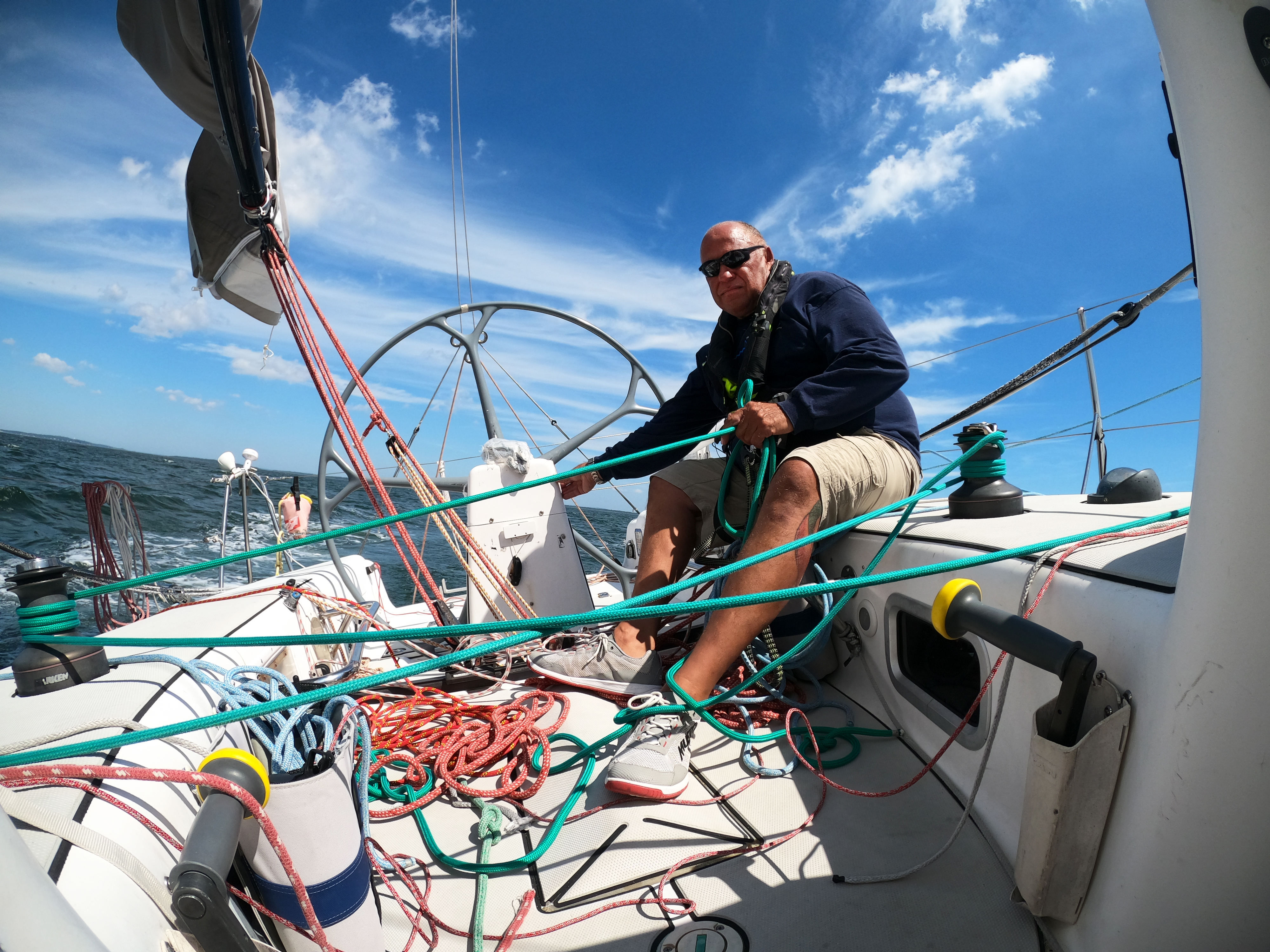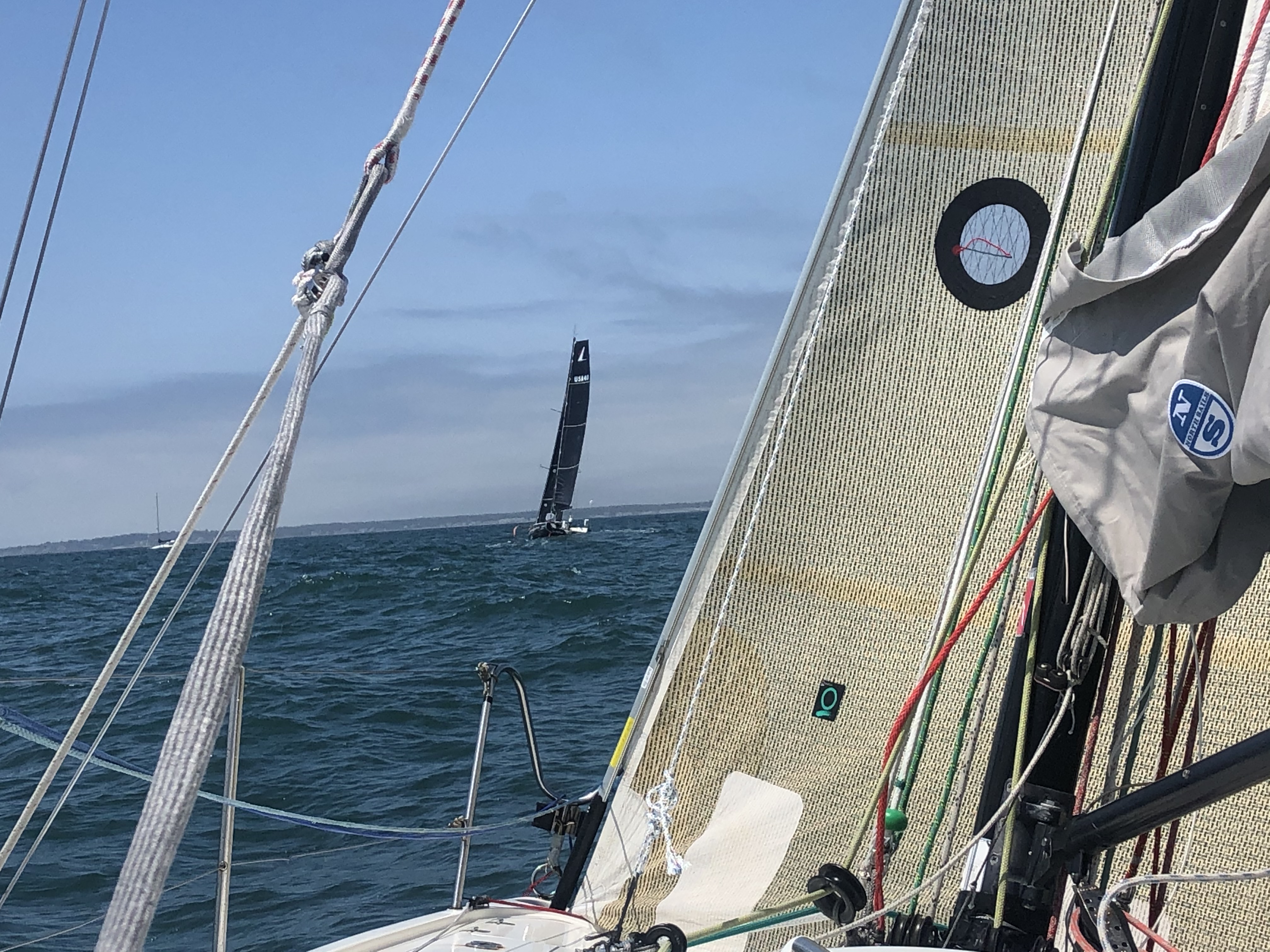
No matter where you live, your occupation, or your age, life will find a way of serving up challenges. Whether big or small, it is often your approach to adversity that will dictate how successfully you overcome it and come out the other side better for it.
This summer has provided learning experiences that I did not expect. I came into the 2020 season with confidence and high hopes for sailing. My season’s goal was to train for the circumnavigation that I will undertake for Sail for Epilepsy, in the fall of 2021. Part of this training was to compete in races which offer significantly greater challenges than sailing on pure training runs. Some areas that I knew I needed to improve on this year included sail management and sail changes, and in the background, making rigging changes to maximize efficiency.

Since I am fortunate to be employed, I sail when I can and must navigate the conditions that are there when I get to the boat. Some of the training is in the evening when the winds are usually declining. Most of my training runs occur in winds of 5-10kts and never above 15kts. With 8 sails, all designed for different wind conditions, I did manage to get some good workouts at the lower end of the wind range. Indeed, two of the races I entered had winds ranging from 1kt to 9kts and we excelled, managing to place third in the doublehanded class of both the Beringer Bowl and in the Round the Island Race. In the latter, we even had to anchor for 45 mins to stop from being swept into the shoals since there was not enough wind to overcome the 2kts of current.
But this summer I had not trained during higher wind conditions. The Offshore 160 is a solo race and turned out to be a challenge in a variety of unexpected ways. The race was delayed by a day due to a tropical storm. When we finally started the race, the winds were 5kts or so and built to 18kts. I started off extremely well. I was in second place behind a new type of boat called a Figaro 3, named La Defoence, which is a very fast boat. After racing for about 9 hours I was soaked from waves breaking over the boat, but happy and excited to be a few miles from the turning point, approximately half way into the race, and able to see the lead boat between me and the turn.

I needed one more tack to turn the boat to the mark and was about to execute this when in the dark I could see a flash, or glint of light, that seemed out of place. I looked and couldn’t believe that a shroud that holds the mast up was swinging free. The mast was being held up by the shrouds on the port side, since the wind was from the port, but this starboard side shroud was going to be needed to hold the mast up when I tacked (turned the boat by 90 degrees) and the wind came from starboard.
My first instinct was for the safety of the boat and myself. Winds were about 18kts, with seas confused, so I quickly dropped the mainsail and furled the jib so there would be minimal load on the mast. My brief (too brief) examination of the problem indicated that a piece of steel was severed and irreparable at sea. I turned the engine on and began heading for home. Once I had contained the situation my excitement about my position in the race pivoted 180 degrees to extreme disappointment.
Now I had to deal with myself, my own mind and how to pick myself up again. I had read about facing similar adversity by other sailors – Alex Thompson of Hugo Boss, and Pip Hare of Medallia – and the strategies that they use. I remembered my own situation racing to Bermuda in 2017 when I had an equipment failure. How does one re-focus your own mind and look beyond the disappointment, essential to making correct decisions and to moving forward?
In this situation I used the strategy of identifying “what I can do” and doing it. My first step was simple: there were some small pieces of paper on the saloon floor. I picked them up and put them in the trash bag. This is something I can control. It has no impact on the status of the boat, but I made a positive step. Next, I tidied the contents of the boat. This significantly boosted my mood and I turned my attention to navigating back to Newport, RI. I went through a mental checklist of boat systems including checking the fuel level. I had not expected to have to use the engine over such a distance and realized that I had insufficient fuel to make it home.
Instead of feeling further defeated, with my mind refocused, I was able to react to the situation and find a way through. Looking at wind directions I realized that with an appropriate sequence of course changes I could sail with just the jib, when the wind was from port, without stressing the mast. When the wind was from starboard, I would take down the sail and use the engine. This would significantly reduce fuel consumption and likely allow me to get back to port. I also chose a course that would take me closer to land, in case other unexpected challenges arose.

Through the night I was able to enjoy a beautiful moonrise, stars and the milky way and arrived near to Newport as La Defoence, the Figaro 3 that I had been chasing, crossed the finish line. It was bittersweet, as I was happy for the skipper, but disappointed that I wasn’t able to chase him through the night.
Through the power of text messaging I was able to reach Sail For Epilepsy advisor Joe Cooper, who met me at the dock. We evaluated the damage and realized that it was in fact, with the appropriate supplies, a simple fix. I nipped off to the local ship store, fixed the problem, and was ready for the next sail.
After this race there were a few take home messages:

- I reacted quickly to the problem and took corrective action to prevent further damage.
- Simple steps, that were under my control, while not addressing the significant problem at hand, enabled me to get my mind in a positive place so that I could address other challenges.
- I needed a checklist of boat components to ensure that I do a physical check, prior to sailing, to make sure the boat is properly prepared. I normally do this check, but without a checklist forgot one important step that could have prevented this problem.
Each time I sail I learn something new. Sometimes it is simply from trying out a new way to lead a line or having an experienced sailor on board who suggests a different way of doing things. Other times an unexpected challenge arises that requires a swift response and a creative solution. In the moment, my resilience in the face of adversity will determine how well I am able to overcome the challenge. By taking simple actions to regain control and refocus my mind, I find I am able to look beyond the disappointment of unfulfilled expectations and instead, view the situation as a learning experience.

